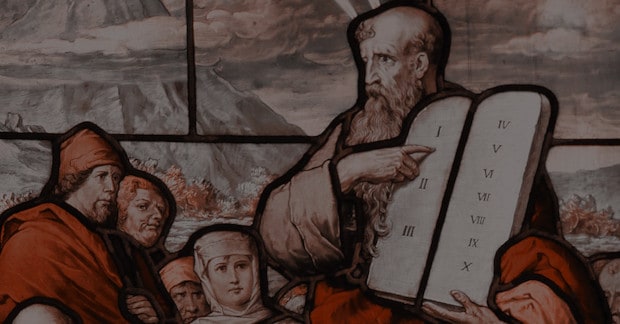By Peter J. Leithart
The Church has always taken the Decalogue [Ten Commandments], with modifications, as God’s word to Christians.1 . . . Has the Church been right? Or is this an unfortunate old covenant residue that needs to be purged from the Church? . . .
The Ten Commandments, God’s ‘Ten Words’
Scripture doesn’t use the phrase “Ten Commandments.” Exodus 20 and Deuteronomy 5 record Yahweh’s “Ten Words” (Exod 34:28; Deut 4:13). These texts contain imperatives, but, like the rest of Torah, they include declarations, warnings, promises. That multiplicity of speech acts is better captured by the phrase “Ten Words” or “Decalogue.” . . .
Israel has been in the wilderness for three months when they arrive at Sinai (Exod 19:1). Behind them are the ruins of Egypt, blighted by plagues. They’ve passed through the sea, received manna and water, grumbled and rebelled. Now the God who revealed his Name to Moses at Sinai (Exod 3:1–12) unveils himself to Israel.
God speaks on the third day of the month (Exod 19:16). Yahweh2 descends with a trumpet blast that summons Israel to assembly. From a fiery cloud, he speaks the Ten Words.
He’s spoken ten words before. Ten times Genesis 1 repeats, “And God spoke.” At Sinai, God again speaks ten words that, if guarded and obeyed, will form Israel into a new creation.3
These ten new-creative words present the form of new creation. . . .
The speaker identifies himself as “Yahweh,” who is “thy God.” At the burning bush (Exod 3), he calls himself “I am who I am.” The Hebrew verbs can be translated with any tense: “I will be who I will be; I am who I will be; I will be who I was.”4 The context clarifies. Yahweh sees Israel’s affliction and hears their cries. He comes to deliver from slavery. “Yahweh” is the God who will be everything Israel needs and do everything Israel needs done. Everything he is, Yahweh is for Israel. “Yahweh” is Israel’s God, the God of Abraham, Isaac, and Jacob, who makes and keeps promises to his people. He is Yahweh “thy God.” . . .
Father-son talk
We may ask, Who was delivered from the house of bondage? Israel, of course, but Israel as son of Yahweh (see Exod 4:23). Yahweh’s “family” tie to Israel provides a legal basis for his demand to Pharaoh: “Israel is my son. You have no right to enslave my son. Let my son go.” When Pharaoh refuses, Yahweh cuts off negotiations and takes up the role of a kinsman redeemer, rescuing his son with a mighty hand and outstretched arm. Yahweh’s justice is precise: Pharaoh seized Yahweh’s firstborn; at Passover, Yahweh takes Pharaoh’s.
God gave his first command to Adam, his first son.5 At Sinai, he speaks to his son, the new Adam. The Ten Words are imperatives, but not merely imperatives. When Father Yahweh speaks to son Israel, he discloses his likes and dislikes. The Ten Words are “a personal declaration”6 that reveals Yahweh’s character. Like Proverbs, they’re a Father-son talk. The ten new-creative words are designed to form Israel into an image of his Father.
The Decalogue is about Israel’s mission. When Israel obeys the Ten Words, his common life becomes a living, filial icon of the heavenly Father among the nations of earth. Hearing the voice from Sinai, Israel takes up Adam’s vocation of imitating and imaging his Father. . . .
Israel cannot listen to the Lord’s voice. He asks Yahweh to speak through Moses (Exod 20:18–21). At Sinai, the son’s heart is too hardened to hear his Father. But Israel isn’t left hopeless. Yahweh will have a son who conforms to the Ten Words. The Father does have such a Son, the eternal Son who became Israel to be and do what Israel failed to be and do.
The heart and soul of the Decalogue
The Ten Words are a character portrait of Jesus, the Son of God.7
The Ten Words lay out the path of imitatio Dei because they lay the path of the imitatio Christi. As Israel kept the commandments, Augustine wrote, “the life of that people foretold and foreshadowed Christ.”8 As Irenaeus said, Christ fulfills the law that he spoke from Sinai.9 The law exposes our sin, restrains the unruly, provides a guide to life. But Jesus is the heart and soul of the Decalogue. The first use of the law is the christological.
Many centuries after Sinai, God returned in the third month, in rushing wind and fire, to pour out his Spirit. At that completed Pentecost, the Spirit began to write “not on stone but on the heart” (see 2 Cor 3:3).10 He forms a new Israel, a company of sons who share Jesus’ Spirit of sonship. By that Spirit, the Father fulfills his ten new-creative words in us.
Is the Decalogue for us?
We might as well ask, Is Jesus for us?
***
This post is adapted from the introduction of The Ten Commandments: A Guide to the Perfect Law of Liberty by Peter J. Leithart, available now through Lexham Press.
Praise for The Ten Commandments:
This little gem of a book is the best introduction to the Ten Commandments I have yet come across. I learned something new on almost every page.
— Kevin J. Vanhoozer, Trinity Evangelical Divinity School, author of Biblical Authority after Babel
Here is a treatment that looks to Jesus as the heart and soul of the Ten Words.
— Hans Boersma, Nashotah House Theological Seminary, author of Scripture as Real Presence
Learn more about the “Ten Words” in The Ten Commandments.
The headings and title of this post are the additions of the editor. The author’s views do not necessarily represent those of Faithlife.
- See Christopher R. Seitz, “The Ten Commandments: Positive and Natural Law and the Covenants Old and New—Christian Use of the Decalogue and Moral Law,” in I Am the Lord Your God: Christian Reflections on the Ten Commandments, ed. Carl E. Braaten and Christopher R. Seitz (Grand Rapids: Eerdmans, 2005), 18–38.
- “Yahweh” transliterates God’s name, which is also represented by YHWH. It’s often rendered as LORD or Lord. Since it’s a personal name, not a title, I have chosen to transliterate it.
-
“Yahweh” transliterates God’s name, which is also represented by YHWH. It’s often rendered as LORD or Lord. Since it’s a personal name, not a title, I have chosen to transliterate it.
- Victor P. Hamilton, Exodus: An Exegetical Commentary (Grand Rapids: Baker Academic, 2011), 64.
- Yahweh’s command to Adam was also delivered on a mountain, Eden (Ezek 28:13–14).
- Edward L. Greenstein, “The Rhetoric of the Ten Commandments,” in The Decalogue in Jewish and Christian Traditions, ed. Hennig Graf Reventlow and Yair Hoffman (London: T&T Clark, 2011), 11. See Stanley M. Hauerwas and William H. Willimon, The Truth about God: The Ten Commandments in Christian Life (Nashville: Abingdon, 1999), 19.
-
John Wesley applies the words of Hebrews to the law: Like Jesus, the law is “the express image of his glory.” Wesley concludes that the law is “divine virtue and wisdom in a visible form.” Quoted in D. Stephen Long, “John Wesley,” in The Decalogue through the Centuries: From the Hebrew Scriptures to Benedict XVI, ed. Jeffrey P. Greenman and Timothy Larsen (Louisville: Westminster John Knox, 2012), 174. Clement of Alexandria offers an imaginative numero-alphabetic interpretation: yod is the tenth letter of the Hebrew alphabet and the first letter of “Jeshua.” Hence: the Ten Words speak of Jesus the Word (Stromata 6.16).
- Augustine, Against Faustus 22.24.
- Irenaeus, Against Heresies 4.16.6.
- Augustine, Sermon 155.6.







